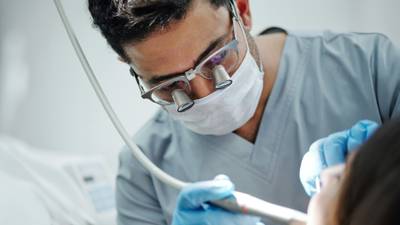Join our flexible online degree in health economics.
Health economics applies economic thinking to the analysis of health and health care. In this postgraduate degree, you’ll:
- get to know the core issues in health economics and their relevance to working health professionals
- master the tools you need to analyse and address the limited resources faced by the health sector, and
- learn to face the challenges of resource allocation as you build your health research skills.
Who can join our online MSc in health economics?
This distance-learning degree is aimed at health professionals. If you’re a professional in health care looking to improve their understanding of health economics and research methods, it’s designed for you.
Study with the award-winning Health Economics Research Unit (HERU)

The first unit in the UK and Europe to focus its research on health economics, HERU was founded in 1977.
Its impactful research informed the introduction of routine breast cancer screening, smokefree legislation, and minimum unit pricing in Scotland.
HERU has active links with health policymakers across the UK, including:
- the Evidence Directorate of Healthcare Improvement Scotland
- the Analytical Services Division (ASD) of the Scottish Government
- NHS Education Scotland, and
- NHS Health Scotland.
What you’ll study
You can choose to study for a:
- Masters (180 credits)
- Postgraduate Diploma (120 credits)
- Postgraduate Certificate (60 credits), or
- start with one of the short courses that make up this degree (15 credits).
How you’ll study
Online learning
This Masters in Health Economics is delivered flexibly, 100% online.
You can learn with us anywhere, no student visa required, and set your study hours to suit you.
Your teaching
Your teaching is delivered through MyAberdeen, our online Virtual Learning Environment (VLE). It holds all the materials, tools and support you’ll need in your studies. Take a look around MyAberdeen.
You can access your learning materials on computer, smartphone and laptop, 24 hours a day. You’ll find a range of resources at your fingertips, including online access to our award-winning Sir Duncan Rice Library.
Each course provides a structured but flexible learning approach through the periodic release of materials, including a study guide or worksheets, links to journal articles and e-books, relevant websites, video and audio podcasts, and online discussions.
Your tutors
You’ll study with a team of practising health economists from our Health Economics Research Unit (HERU).
Your tutors are actively involved in policy-shaping research, and HERU is one of the leading centres for health economics research in Europe.
We’re a Queen’s Anniversary Prize winner for our sustained excellence in health economics research over the last 40 years.
Assessments
This degree is assessed entirely online. We use several types of assessment, including multiple-choice quizzes, short-answer tests, essays and presentations.
Hours for taught courses
To study part-time, we recommend you take no more than 30 credits per term. Students typically take one or two 15-credit short courses per term.
15 credits
- Around 150 hours of study and assessment time to complete.
- You’ll study 10 – 15 hours per week per term.
30 credits
- Around 300 hours of study and assessment time to complete.
- You’ll study 20 – 30 hours per week per term.
This is an indicative guide to the time required for a typical student at this level to achieve the learning outcomes. This includes time for independent study, as well as teaching and assessments.
You can largely set your own study hours each week to cover the materials. MyAberdeen is available 24/7, so you can log in and study when it suits you.
Activities at fixed times
There may be some activities scheduled at a fixed time, such as online meetings with your tutor or assessments with deadlines. But otherwise, you can access and work through each course at your convenience.
Hours for 60-credit projects
A 60-credit project is around 600 hours of study time.
This is around one term of full-time study.
You can dedicate a full term to your project and work on it full-time. Or you can complete it part-time, spreading the hours you dedicate to it over two terms.
When you study with us, you can expect a first-class support structure so that you’re never alone in your studies.
But learning online does mean you have to motivate yourself and manage your own time.
Your most important commitment will be time – the time to work through, reflect on and understand your teaching materials.
Before you start a course that involves a high degree of independent study, we recommend looking at the time you will be able to devote to your studies each week:
- Be realistic
- Create a weekly schedule as a guide
If you have any questions about studying online, get in touch with our friendly team. We’re here to help.
Our first-class support structure will ensure that you aren’t alone in your studies. You’ll have contact with your tutors via MyAberdeen and email. You can use social media and discussion boards to chat with your fellow students too.
We provide a wide range of services to support you in your studies and beyond:
- Careers and Employability Service
- Disability support
- IT support
- Library support
- Student Support Service – help with finances, wellbeing and non-academic issues
- Student Learning Service – study support, with advice sessions available
- Aberdeen University Students’ Association (AUSA) – run by students for students
- Toolkit – clever apps and free training that can make your study life easier
Wherever you are in the world, you’ll feel part of our very special Aberdeen learning community.
We’re a member of the Access scheme run by the Society of College, National and University Libraries (SCONUL).
Access study spaces, books and journals in your area
The SCONUL Access scheme allows you, as a University of Aberdeen student, to access books and resources at university libraries across the UK and Ireland, or visit them for a quiet place to study.
You’ll be able to use study spaces, books and journals at over 150 university libraries which belong to the scheme.
Your support team
Our friendly team are here to answer any queries you have about your studies.

Dr Shelley Farrar
Shelley is the degree coordinator. She’ll be on hand to answer any questions about degree content before you start and to help you throughout your studies.

Get in touch
The online education team is here to answer any questions you have right now about this qualification, or about studying online.
Ask us a questionWhere this will take you
Careers
Economic analysis is regularly drawn upon by policymakers and regulators in the health care sector, by professionals in the pharmaceutical industry and by clinicians and managers involved in the organisation, purchasing and provision of health care.
However, given the shortage of health economists in Scotland, the UK and internationally, and, therefore, health economics knowledge and skills, it is increasingly important for non-economists to have a clearer understanding of how they can effectively apply and interpret economic concepts and utilise tools in their own organisation.
Industry Links
You’ll benefit from HERU’s strong links with health policymakers across the UK, including:
- the Evidence Directorate of Healthcare Improvement Scotland
- the Analytical Services Division (ASD) of the Scottish Government
- NHS Education Scotland, and
- NHS Health Scotland.

Lifelong career support
Our career support doesn’t stop when you graduate.
You have access to our free careers service while you study, and beyond.
- 1:1 appointments
- CV checks
- Interview prep
- Job opportunities
Fees and funding
Tuition fees typically increase each year. A 3% fee rise has been confirmed for academic years 2026/27, 2027/28 and 2028/29.
Our indicative costs include a 3% fee rise each year.
Pay as you go
This is a pay-as-you-go qualification.
You do not have to pay the full tuition fee upfront.
You can spread the cost and pay as you go, term by term.
How it works
- You decide how many credits to study for each term.
- At the start of term, you pay only for the credits you’re taking that term.
- This gives you control over your costs and workload for each term of your qualification.

Your personalised cost breakdown
Use the degree scheduler to plan your studies and see your cost breakdown, term by term.
Learning resources
Access to all the books and resources you need are included in your tuition fee. They’ll be made available to you online and you do not have to buy your own copies.
Printing
You may wish to set aside a small budget for printing, depending on how you like to work.
There are several ways you may be able to get help funding your studies:
- Employer sponsorship – we accept full and partial fee payments from sponsors
- Student loans
- Scholarships – search our funding database for scholarships
Find out more about funding options.
Student card
All our students are entitled to a University of Aberdeen student card. This gives you access to a range of student discounts around the city and online.
20% Alumni discount
You’re entitled to 20% off our postgraduate taught degrees and short courses if you have a degree from the University of Aberdeen. View Alumni discount details.
10% NHS discount
NHS staff receive 10% off online postgraduate degrees and short courses offered by our School of Medicine, Medical Sciences and Nutrition; our School of Psychology; and our ILM leadership courses. View NHS discount details.
How discounts work
Discounts are applied during your application process. Only one discount can be used per application. If you are eligible for more than one discount, we will apply the largest discount for you.
Why study health economics online with the University of Aberdeen?

You’re in expert hands
We’ve been delivering online and distance learning for decades.

Award-winning research
We’re proud winners of the Queen’s Anniversary Prize, the highest national honour for a UK university, for sustained excellence in health research over the last 40 years.
Why we were awarded the Queen’s Anniversary Prize
NHS and alumni discounts
NHS staff get 10% off this online degree. University of Aberdeen alumni get 20% off.
Entry requirements
MSc, PgDip, PgCert
- A 2:2 UK honours degree (or equivalent).
You can also apply if you have:
- alternative/lower qualifications and an appropriate level of relevant experience.
These are our minimum entry requirements. They are given as a guide and do not guarantee entry.
Short course route to online MSc Health Economics for Health Professionals
If you do not meet these entry requirements, or are not ready to commit to a full MSc, you may be able to use our online short courses as a route into this degree.
Find out about our short course route to entryYou apply through our online Applicant Portal. It allows you to upload relevant qualifications and documents.
There is no application fee for our online programmes.
What you need to apply
- Degree transcript
- Personal statement
- Degree certificate
- CV / Resume
- Reference
Reference
You will need a reference letter from your university discussing your academic ability. If you have been out of education for a long time, you can use your current or most recent employer or another professional person.
Apply now
Start with our step-by-step guide. It explains degree transcripts, what to write in your personal statement and how to use our Applicant Portal.
Apply as early as you can. This is so we have time to review your application and get a decision to you. We also want to ensure you have time to enrol before teaching starts.
September 2026 intake
For our September 2026 intake, the application deadline is 6 September 2026.
You will need to accept your offer and provide any outstanding documents to meet the conditions of your offer by 13 September 2026.
Teaching starts on 21 September 2026.
Entry requirements
We welcome students from all over the world.
See the minimum entry requirements above. If you do not have qualifications from the UK, check equivalent qualifications from your country.
Visa requirements
You do not need a student visa to study online with us.
English language requirements
Teaching is delivered in English.
If English is not your first language, use our English requirements checklist to see if you need to provide evidence of your English language skills when you apply.
English language tests and scores
If you do need to provide English language test scores, these are the tests and minimum scores we accept.
These are our Postgraduate Higher requirements.
IELTS Academic, IELTS UKVI Academic, or IELTS Online (not IELTS Indicator or IELTS General Training)
- 6.5 overall
- 5.5 for listening and speaking
- 6.0 for reading and writing
TOEFL iBT or TOEFL iBT Home Edition
- 90 overall
- 17 for listening
- 21 for reading
- 20 for speaking
- 21 for writing
- TOEFL DI code is 0818
Cambridge English: B2 First, C1 Advanced, or C2 Proficiency
- 176 overall
- 162 for listening and speaking
- 169 for reading and writing
LanguageCert Academic / LanguageCert Academic SELT
- 70 overall
- 60 for listening and speaking
- 65 for reading and writing
Oxford ELLT Digital – English Language Level Test Online
- 7.0 overall
- 5.0 for listening and speaking
- 6.0 for reading and writing
PTE Academic (online test not accepted)
- 62 overall
- 59 for listening, reading, speaking and writing
Skills for English: SELT
- B2 pass with merit
Duolingo – tests taken from 1 July 2024 onward
- 120 overall
- 95 for listening and speaking
- 105 for reading and writing
University of Aberdeen English Pre-sessional Programme (PSE)
- Pass
- Valid for one year. Refresher can be offered if out of date
Pre-sessional academic English preparation programmes undertaken at other UK universities
- Pass at an equivalent of 6.5 (C1)
- B2 in all four skills
- Certification must be within one year prior to the start of your course
For more information about language qualifications see our English Language Requirements page.
You will need access to:
A computer (PC, laptop or Mac) with an up-to-date operating system
Most teaching materials are smartphone- and tablet-friendly. But we recommend a proper laptop or desktop for completing assignments comfortably.
Reliable internet access
We recommend:
- a wired connection
- a minimum download speed of 2 Mbps so you can take part fully in live sessions.
Speakers or headphones
- We recommend a headset with built-in microphone and earphones if you’re likely to study in an environment with background noise.
- A webcam is optional, but you may like to use one for some interactive sessions.
Software
We’ll give you access to Office365 applications. This means you can use online versions of Microsoft Word, Excel, PowerPoint and OneDrive and install these programs on up to five personal devices.
If your course requires specialist software, we’ll provide you with access to this and a licence that lasts throughout your studies.
See our detailed IT requirements for more information.
Try our degree scheduler

Choose your courses
See all the courses that are part of this degree and choose what you want to study.

Manage your study schedule
Control the pace and cost of your degree. Decide how much you want to study each term.

Save to your wishlist
Save your schedule to your wishlist so you can view and edit anytime.
Master of Science
180 credits
£17,060
This indicative cost is based on 180 credits of study over 28 months, starting in September 2026.
Postgraduate Diploma
120 credits
£11,320
This indicative cost is based on 120 credits of study over 20 months, starting in September 2026.
Postgraduate Certificate
60 credits
£5,580
This indicative cost is based on 30 credits of study per term, starting in September 2026.
Start with a short course
£1,395
This indicative cost is based on 15 credits of study in the 2026/27 academic year.
Apply for this programme
- Start month
- September
- Indicative cost
- £17,060
This indicative cost is based on 180 credits of study over 28 months, starting in September 2026.
Apply via our Applicant Portal







